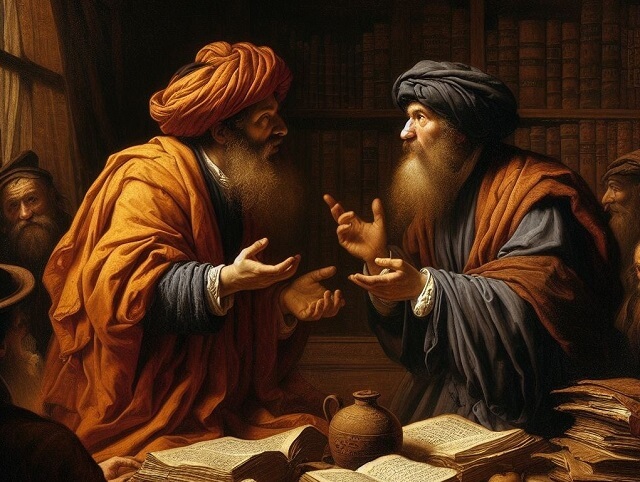
The strife among Jacob’s sons centered on two conflicting viewpoints regarding the sanctity of the Jewish people. Judah felt that we need to act according to the current reality and that, given the present situation, the Jewish people need to maintain a separate existence from other nations in order to safeguard their unique heritage.
Joseph, on the other hand, believed that we should focus on the final goal. We need to take into account the hidden potential of the future era, when “nations will walk by your light” (Isaiah 60:3). According to Joseph, even nowadays we are responsible for the spiritual elevation of all peoples.
So which outlook is correct: Judah’s pragmatic nationalism or Joseph’s visionary universalism?
The Present versus the Future
The dispute between Judah and Joseph is in fact a reflection of a fundamental split in the world. The rift between the present reality and the future potential is rooted in the very foundations of the universe.
On the second day of Creation, God formed the rakia, the firmament separating the waters below from the waters above (Gen. 1:7; see Chagigah 15a). This separation signifies a rupture between the present (as represented by the ‘lower waters’ of this world) and the future (the ‘higher waters’ of the heavens). The inability to reveal the future potential in the present is a fundamental defect of our world. Unlike the other days of Creation, the Torah does not describe the second day, when this breach occurred, as being ‘good.’
Joseph and the Letter Hey
According to the Midrash ( Sotah 36b), the angel Gabriel taught Joseph seventy languages. Gabriel also added the Hebrew letter hey from God’s Name to Joseph’s name, calling him ‘Yehosef’ (Psalms 81:6). What is the significance of this extra letter?
The Sages wrote that God created this world with the letter hey, and the World to Come with the letter yud (Breishit Rabbah 12:9). In Joseph’s view, each nation is measured according to its future spiritual potential, according to how it will fit in the final plan of kiddush ha-Shem, the sanctification of God’s Name and revelation of His rule in the world. The particular role of each nation is indicated by its unique language. Without the letter hey, however, Joseph could not properly grasp the language of each nation, i.e., he could not ascertain the nature of their role in the future world. With the addition of the letter hey to his name — the letter used to create this world — Joseph gained the ability to understand the universe as it exists now. Joseph was then able to comprehend the languages of all peoples and assess their spiritual potential.
Joseph was able to discern the world’s potential for kiddush ha-Shem with the help of a single letter. He used the hey, a letter that is closed from three sides, as this future potential is currently almost completely hidden. Judah, on the other hand, looked at the world’s spiritual state as it is currently revealed.
Joseph, who sanctified God’s Name in private, merited one letter of God’s Name. Judah, who sanctified God’s Name in public, merited that his entire name was called after God’s Name (Sotah 36b).
Two Types of Tzaddikim
According to the Zohar, Benjamin complemented his brother Joseph.
‘Rachel gave birth to two tzaddikim: Joseph and Benjamin. Joseph was
a “higher tzaddik,” while his brother Benjamin was a “lower tzaddik”
(Vayeitzei 153b). What are these two types of saintly tzaddikim?
The higher tzaddik is a conduit for the shefa (the Divine influence), drawing it down from above. The lower tzaddik, on the other hand, passes the shefa to the physical world below.
Benjamin’s role, as the lower tzaddik, was to imbue our world with holiness. His whole life, Benjamin was concerned that the Temple should be built in the portion of Eretz Yisrael that his tribe would inherit. Why was that so vital to Benjamin?
The Temple is “a house of prayer for all peoples,” allowing all to share in its holiness. “Had the nations known how important the Temple was for them, they would have surrounded it with forts to guard over it” (Tanhuma Bamidbar 3). The Temple has a fundamental role in Joseph’s universal outlook.
The Monarchy and the Temple
The dialectic between Judah and Joseph finds expression in two institutions: the monarchy and the Temple. The monarchy, whose role was to protect the national sanctity of the Jewish people, was established in Judah’s inheritance, in Hebron and Jerusalem. The Temple, whose role was to elevate all of humanity, was built on Benjamin’s land.
However, the Temple was partially located on a strip of land that extends from Judah’s portion into Benjamin’s portion. This strip represents the synthesis of Judah and Joseph, the integration of the national and universal viewpoints.
Mikeitz, the name of the Torah reading, means “at the end.” The Midrash Tanchuma explains that God established an end for all things. Just as Joseph’s imprisonment ended in Mikeitz, so too, the conflict between Judah and Joseph will be resolved after a constructive period of development and change. The fundamental dissonance in the world will be repaired, and the rift between the present and the potential, between the lower and higher waters of creation, will be healed.
(Sapphire from the Land of Israel. Adapted from Shemuot HaRe’iyah 10, Miketz 5690 (1929))